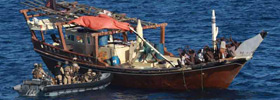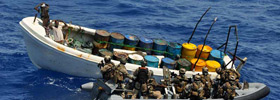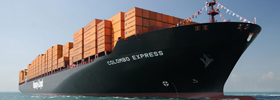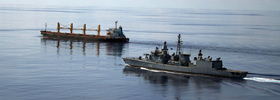Referat S14
Bernhard-Nocht-Straße 78
20359 Hamburg

Dr. Anja Eikermann
Phone: +49 40 3190-7420
Mail: maritime.security@bsh.de
Security (ISPS) • Piracy prevention
- International Ship and Port Facility Security Code (ISPS Code)
- ISPS compliant port facilities
- Security officers
- Recognized Security Organisation (RSO)
International Code for the Security of Ships and Port Facilities (ISPS-Code)
Since July 2004 comprehensive security measures, developed by the International Maritime Organization (IMO) to improve maritime security, apply to ships and port facilities all over the world. The ISPS code applies, inter alia, to cargo ships of 500 GT and above and to passenger ships regardless of size, engaged on international voyages, as well as to port facilities serving such ships.
The following pages provide information on the security arrangements on board of ships. Details on specific security measures, requirements and obligations to report are given and forms, e.g. for applications, are provided.
ISPS compliant port facilities
A list of the ISS compliant port facilities is available at the IMO Global Integrated Shipping Information System (GSIS; registration neccessary).
Security officers
Ship Security Officer (SSO)
On each ship a ship security officer shall be designated. His duties include, but are not limited to, regular security inspections, training of the ship’s crew while on board, reporting of all security incidents and co-ordinating implementation of the ship security plan with the company security officer (CSO) and the port facility security officer (PFSO).
Since 1 July 2009 any SSO must hold a Certificate of Proficiency according to regulation VI/5 of the annex to the STCW-convention. Please observe also the notes on training.
Company Security Officer (CSO)
Each Company shall designate a company security officer (CSO). The CSO must have completed a security training programme at a training facility approved by the BSH. The duties and responsibilities of the CSO include, but are not limited to performing of ship security assessments, developing the ship security plan and ensuring the implementation of the ship security plan on board in his capacity as representative of the company.
Here you will find information on the requirements regarding the CSO training(in German). The BSH accepts training courses of foreign training facilities, as long as they comply with the requirements of IMO model course 3.20 (CSO). Please observe also the notes on training.
Notifications of change(s) regarding the CSO are to be directed to the BSH, Section S14, in accordance with section 4, paragraph 2 of the German Ordinance on Shipboard Security Measures (See-Eigensicherungsverordnung, SeeEigensichV).
Recognized Security Organisation (RSO)
The RSO is a recognized classification society, complying with the relevant EU guidelines, globally organized and maintaining a German branch office. The main tasks of a RSO are the preliminary examination of ship security plans and ISPS verifications on board of German-flagged ships. Here you can find further information on Recognized Security Organizations (RSO); as well as in the interim guidelines by the Maritime Safety Commitee contained in MSC/Circ. 1074.
Piracy
Modern piracy is a severe threat to shipping, especially on the trade routes between Europe, Africa and Asia. Crew members and passengers have been and continue to be injured, abducted or even killed in pirate attacks.
There are various options to fight piracy: Shipowners should observe the latest warning notices and safety levels, when operating ships in areas threatened by piracy. Crews should be prepared by training and their ships fitted with appropriate defence technology. Last but not least, privately contracted armed security personnel provide additional protection against piracy.









